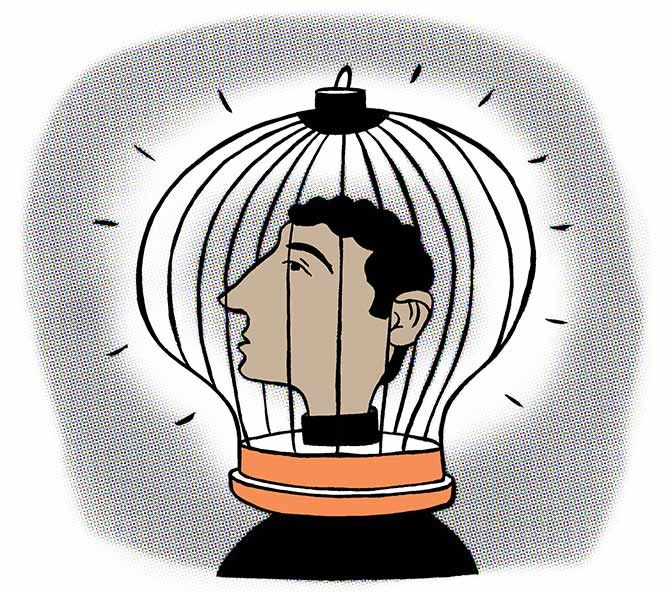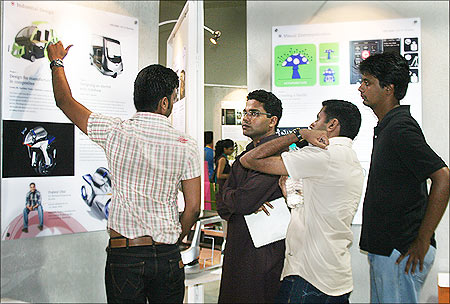'There is little point in getting adoption without profit sustainability or the converse.'
'This is the dilemma that many Indian innovators face,' says R Gopalakrishnan.
Illustration: Uttam Ghosh/Rediff.com

How do you assess the impact of an innovation?
Consider which of these four innovations has made the greatest impact on mankind -- the invention of anaesthesia, the synthesis of urea fertiliser, the discovery of penicillin or Internet/e-mail.
The answer depends on how greatly the innovation has been adopted and how much it has changed people's lives.
Popular reportage considers metrics such as research and development staff employed, technology expenditure, revenue from new products and the number of patents obtained.
Publicity amplifies the 'wow' factor through breathless accounts of individual genius.
Do you know of the genius who invented the Internet/e-mail? You don't because there is a lineage from Leonard Kleinrock (1961), Ray Tomlinson (1971), Vincent Cerf (1973) to Tim Berners-Lee (1990).
Had it not been for the sequential adaptations through this lineage, consumer adoption would not have occurred, thus creating human impact.
Financial impact is important, but human impact is far more important.
How many people are aware of the innovation and have experienced it?
How many have adopted it? How has it changed the lives of those who have adopted it?
Brands measure their impact using similar metrics.
Brand share is brand adoption multiplied by usage.
The same principle can be used to measure innovation impact.
The theories of Pierre Bourdieu (1930-2002), a French social scientist, are also useful to think about innovation impact. Bourdieu had said that power in politics arises from social capital and habitus.
Innovation impact is the multiplication of innovation capital, innovation habitus and innovation adoption.
Innovation capital derives from first, intellect (technology, patents, trademarks); second, articulation (the idea being heard and understood); third, culture (initial struggles, obstacles) and symbolism (recognition and awards).
Several Silicon Valley innovators graduated from or dropped out of top schools, were great articulators of their ideas, acquired visibility by mingling and appearing with the high and mighty at Davos-type events and acquired great valuations.
These factors contribute to accumulating innovation capital.
Innovation habitus is the knowledge of how to negotiate the world and how to develop stories, mannerisms, opinions and style.
Recall how Uber was widely reported to have been dreamt up after someone failed to get a cab, how Airbnb was founded after renting sleeping bags in a crowded Washington, DC, or how an inexpensive car became an idea after seeing a family on a two-wheeler.
The reader can easily recognise innovation capital and habitus by recalling acknowledged innovators like Bill Gates, Steve Jobs and Elon Musk.
Breathless media reportage about start-ups and founders adds to those entrepreneurs' innovation capital and habitus; conversely, the relatively lower capital and habitus give an institution less innovation power.
Innovation adoption: It is the most important and regrettably under-recognised.
It is about how many consumers adopt the innovation at a price level that creates a sustainable business model.
There is little point in getting adoption without profit sustainability or the converse.
This is the dilemma that many Indian innovators face.
Only when an innovator persuades the burgeoning, targeted millions of Indian consumers to adopt affordable water purifiers or feminine hygiene products at a sustainable margin can we sense the innovation adoption and impact.
Several bottom-of-the-pyramid and Indian innovations fail to develop high adoption levels or to demonstrate the stamina of profitability.
Clever but low impact: Experiencing inadequate adoption for a clever idea happens all over the world.
American innovator Frances Gabe died in obscurity the day after Christmas 2016 at the age of 101. She had devoted her lifetime to developing clever technologies, which could reduce the drudgery of house cleaning.
She designed the world’s first and only 'self-cleaning home'. What a fabulous idea!
In 1984, she got a patent for her invention and the self-cleaning home built by her had 68 individual inventions.
In her heyday, she acquired a fair amount of public profile as dictated by her innovation capital and habitus.
Alas, her innovation impact was low because it could not get enough adoption. You may not have even heard of her!
The focus of our frenetic awards environment needs to shift from clever ideas to innovation adoption.
Innovators and judges of innovations should shift their attention to actual adoption through a sane business model amongst the three factors of innovation capital, habitus and adoption.
R Gopalakrishnan is a writer, corporate advisor and distinguished professor at IIT Kharagpur; rgopal@themindworks.me











